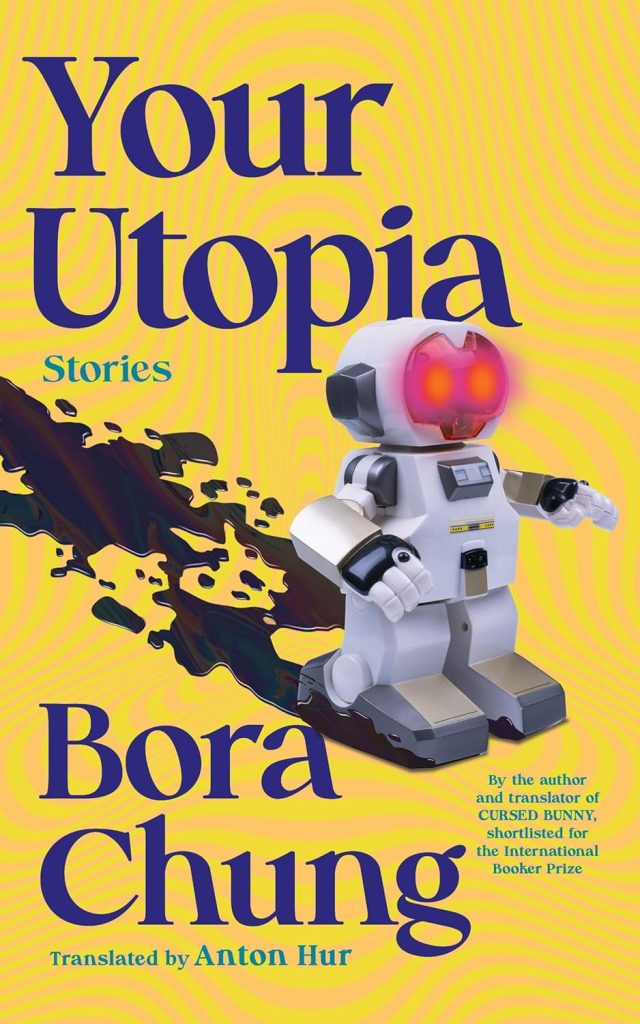
translated by Anton Hur
original publication (in Korean): 2021
this edition: Honford Star, 2024
grab a copy here or through your local independent bookstore or library
“The Center for Immortality Research”
“The End of the Voyage”
“A Very Ordinary Marriage”
“Maria, Gratia Plena”
“Your Utopia”
“A Song for Sleep” [read here]
“Seed”
“To Meet Her”
Anyone paying attention to SF in translation over the past decade would notice a welcome explosion of Korean speculative fiction in English. Of the 21 works of Korean SFT published since Cho Se-Hui’s The Dwarf in 2006 (the first in English that I’m aware of), half have come to us just in the past 3 years. Since 2021, Choi Jin-young, Bora Chung, Djuna, Kim Bo-young, Kim Un-su, Choi Jeong-Hwa, and Pyun Hye-young have brought us a diverse array of surrealism, science fiction, and the fantastic. Thanks to Anton Hur’s beautiful translations, in particular, Anglophone readers have had access to some of the most interesting Korean science fiction being written today.
Hur’s latest translation is Bora Chung’s science fiction collection Your Utopia, which follow’s Chung’s acclaimed previous collection Cursed Bunny (winner of a PEN/Heim Grant and shortlisted for the 2022 Booker International Prize). One gets the sense in this latest group of stories that Chung is quite comfortable in this subgenre of speculative fiction, confidently exploring everything from artificial and ecological intelligence to zombies in space. An immortality research center, an abandoned Mars base, a high-rise hi-tech apartment building–such spaces allow Chung to work out ethical and moral questions about human-AI (and even AI-AI) interactions and how different kinds of life fight for their right to exist.
Chung’s wry humor comes through in the very first story, as a low-level employee (just an employee? wink wink) in an immortality research center is tasked with a major project and then finds herself an accomplice to a DVD thief. The wry humor quickly becomes black humor in “The End of the Voyage,” after a mysterious disease breaks out all over the world: without warning, people just start…chomping on one another. Chung dispenses with the bloody, drooling, arm-waving zombie lurch here; she makes the zombie trope much more sinister, since no one knows who is affected. The narrator is part of a group of scientists and government officials who escape into a spacecraft and attempt to find a cure that they can bring back to Earth. The Disease follows them, though, but Chung carefully controls what we know and don’t know, resulting in a creepy ending. This story reminded me of Keren Landsman’s “Schrödinger’s Gorgon” (tr. Emanuel Lottem): a sci-fi thriller set on a spaceship about an alien virus that is transmitted through sight.
My favorite stories of the collection, though, have to be “Your Utopia,” “A Song for Sleep,” and “Seed” (which I suspect will be many other readers’ favorites). The first two feature AI protagonists that exhibit the very human emotions of regret, fear, desire, and even love. One gets the sense that Chung isn’t trying to show us that future AI will be able to achieve this, but rather that the interface of robot existence and human feeling will produce a new landscape of ethical and moral questions. In the title story, a lonely rover-like car roams the Martian landscape with a robot companion in its back seat, searching for a place to recharge itself after the human colonists have abandoned the base. Its encounters with a menacing Monster made up of discarded machines is reminiscent of Stanislaw Lem’s The Invincible (tr. N. Katherine Hayles), where abandoned technology begins to form its own kind of collective consciousness. The car’s worries about its own continued existence and the fate of its backseat companion make it a very human kind of character.
A similar attentiveness to the ill or endangered characterizes the elevator in “A Song for Sleep.” When an old, lonely woman begins to ride this intelligent elevator, the machine (as it does with all of the residents) looks into her history and preferences, attempting to accommodate itself to its occupant. When it finds that almost no information is available, the elevator becomes curious, developing an obsession with finding out what the woman likes and then trying to make her happy by playing a favorite song. The elevator witnesses the woman’s physical decline and grows to care for her, so much so that when she dies, the machine must process feelings that it was not designed to deal with.
Chung’s exploration of biotechnology’s negative impact on the natural world in “Seed” asks readers to think more deeply about what it means for corporations to control ever more land and resources. Set in an unspecified time in the future, “Seed” imagines what might happen when those tiny granules of life evolve to sprout in and on humans, turning them into human-plant hybrids.
Ultimately, what makes Your Utopia so enjoyable is its unexpectedness- the reader never knows what kind of story will come next. Chung’s vibrant imagination and Hur’s excellent translations make this collection a fantastic choice for readers.
